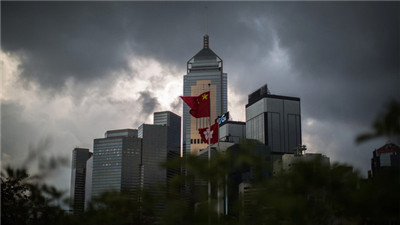(单词翻译:单击)
Kennedy Town is among the few remaining districts on Hong Kong island where hole-in-the-wall noodle joints and traditional tea houses outnumber clothing stores and US coffee shops.
在坚尼地城(Kennedy Town),不起眼的面店和传统茶馆要多于服装店和美式咖啡馆,香港岛上这样的街区已经不多见了。
The town, named after Hong Kong’s seventh British governor Arthur Edward Kennedy, was for many years inhabited by a working-class community. Low-rise apartment blocks and industrial buildings dating back to the 1950s have yet to be knocked down despite planned redevelopment.
坚尼地城是以英国派驻香港的第七任总督坚尼地(Arthur Edward Kennedy)的名字命名的,多年来一直是工薪阶层的聚居区。这里的低层公寓楼和工业建筑最早建于20世纪50年代,虽然有重新开发的计划,但至今那些老建筑仍未被推倒。

To the relief of many locals, few mainland Chinese tourists venture into this part of town. No high-end retail stores are here to sate their appetite for luxury goods. As the last stop on the tram line, Kennedy Town has developed far more slowly than other areas on the island.
令许多当地人安心的是,还没有多少中国内地游客闯进这片区域。这里没有高端零售店,满足不了内地游客对奢侈品的欲望。作为有轨电车的终点站,坚尼地城的发展速度远远落后于香港其他片区。
However, this appears to be changing. A new subway station connecting Kennedy Town to central Hong Kong has opened, while western-themed restaurants and bars are replacing local diners. Developers are determined to revitalise the area to serve a growing number of wealthier residents, which means rents and property prices will rise. The remaining working-class community is starting to shift to the New Territories north of Hong Kong island.
然而,这一现状似乎正在改变。一个新地铁站已经开通,将坚尼地城与市中心连接起来。西式餐馆和酒吧正逐渐取代本地小饭馆。开发商决心要恢复这个片区的活力,以服务日益增多的富裕居民,这意味着租金和楼价都会上涨。剩下的工薪阶层开始陆续搬往香港岛以北的新界。
For many locals, these changes are yet another sign that Hong Kong’s local culture is eroding. At street level, there is a sense that the city is becoming less “Hong Kong” and more mainland Chinese in character and that the lines between both are blurring.
在许多本地人看来,上述变化是香港本土文化日渐式微的又一迹象。从街道外观上,这座城市给人感觉正变得越来越不“香港”,越来越像中国内地,而两地间的界线在不断模糊。
In Causeway Bay, a crowded district on Hong Kong island, rising rents — buoyed by an influx of mainland Chinese property buyers — have forced traditional clothing stores to shut down. Only a handful of high-margin businesses, such as luxury European retailers or pharmacies selling milk powder to mainland Chinese mums, are able to afford the rents. Louis Vuitton, the French luxury retailer, has two stores in Causeway Bay and more stores across all of Hong Kong than in London.
铜锣湾是香港的一个繁华地区,由于中国内地购房者涌入抬高了这里的租金,传统服装店被迫关门。只有少数高利润的商店能付得起租金,如欧洲奢侈品零售商或卖奶粉给中国内地妈妈的药店。法国奢侈品零售商路易威登(Louis Vuitton)在铜锣湾有两家门店,全香港的路易威登店比伦敦的还多。
“Imagine 10 shops on one street, of which eight are watch and jewellery shops or pharmacy stores selling milk powder,” says Ho Chun Sing, a self-employed resident of Hong Kong who recently moved out of Causeway Bay in search of a quieter neighbourhood.
香港自由职业者何振声(音译)说:“试想一条街上有10家店,8家都是钟表店、珠宝店,或者是卖奶粉的药店。”为了寻找一个安静的社区,他最近搬出了铜锣湾。
“Do the people of Hong Kong really need that many? How do large shopping centres and entertainment complexes that cater to mainland Chinese people benefit Hong Kong residents?” What angers locals, he adds, is that the government does not seem interested in improving the lives of ordinary Hong Kong people.
“难道香港人真的需要这么多这种店?大型购物中心和娱乐中心都是满足中国内地人的,香港居民怎么会受益呢?”他说,本地人感到恼火的是,香港政府对改善普通市民生活似乎并不感兴趣。
Mr Ho is one of an increasing number of younger residents who believe their prospects under Chinese rule have deteriorated. Rising inequality is a key issue. Hong Kong’s property market has seen average prices more than double in the past decade, according to Centaline, a property agent.
越来越多像他这样的香港年轻人相信,在中国统治下,他们的日子会越来越难过。日益严重的不平等是个关键问题。根据中原地产代理公司(Centaline)的数据,近十年来香港房地产市场平均价格已经翻了一倍以上。
The city’s gini coefficient, a measure of income inequality, is up 25 per cent from the 1970s and higher than in many developed countries including Singapore. Ordinary locals are frustrated with what they view as China’s rising influence in all aspects of their lives from everyday business to politics and culture.
基尼系数是一个衡量收入不平等程度的指标,香港的基尼系数从20世纪70年代以来已上升了25%,高出许多发达国家,其中包括新加坡。香港的普通市民认为,从日常事务到政治和文化,中国越来越多地影响着他们生活的方方面面,他们对此感到不满。
“All decisions by the government seem oriented towards serving mainland Chinese tourists,” says Pamela Low, who moved back to Hong Kong after the handover.
香港主权移交后搬回香港的Pamela Low说:“香港政府的所有决定似乎都以服务中国内地游客为导向。”
The frustrations of the island’s inhabitants are manifested by the increasingly common sight of a local deriding mainland Chinese visitors for behaviours such as spitting, jumping the queue or eating on the subway.
有一种现象就体现出了香港市民的不满情绪,他们越来越经常嘲笑内地游客随地吐痰、插队、在地铁上吃东西等行为。
The Chinese government recently introduced measures encouraging tourists to improve their etiquette when travelling abroad. Yet young Hong Kongers such as Adrian Li, who works at a law firm, remain sceptical: “The quality of mainland visitors will probably not improve in the short-run. Many Hong Kong locals would rather lose their business than have them here.”
中国政府最近出台措施,劝告游客在境外旅行时注意礼仪。然而像Adrian Li这样的香港年轻人仍持怀疑态度。在律所工作的Adrian Li说:“内地游客的素质短期内大概不会提高。许多香港本地人宁愿丢掉生意,也不愿内地游客来这儿。”
Mainland shoppers made up a third of Hong Kong’s retail receipts and 10 per cent of GDP in 2013, notes Capital Economics, underscoring the city’s increasingly reliance on Chinese demand.
凯投宏观(Capital Economics)指出,2013年香港有三分之一的零售收入和10%的本地生产总值(GDP)都是内地消费者贡献的,凸显了这座城市日益依赖于来自中国内地的需求。
Therein lies the challenge for the city. Until recently, Hong Kong served as shining example of capitalism that worked. As long as most locals benefited, it was acceptable to erect an 80-storey building beside a “wet market” selling fruit and vegetables. Hong Kongers managed to adapt.
这也正是香港所面临的挑战。不久前,香港还被当做成功推行资本主义的光辉榜样。只要大多数本地人能受益,人们就可以接受将一座80层高的大楼建在卖水果蔬菜的“湿货市场”旁边。香港人设法适应了这种现实。
Today’s image of the island is more complicated. It evolves but with a sense that it is leaving many locals behind.
今日香港在世人心目中的形象比较复杂。它在前进,但感觉上它将许多港人甩在了后面。


